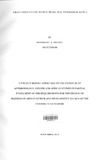| dc.description.abstract | The existence of gender inequalities has continued to undermine human and social development for many decades. Eliminating gender inequality to allow for equal opportunities in all industries including the media is one of the biggest challenges facing the world today. Although globally women media practitiouers are making significant contribution as workers in the media sector, they are faced with numerous challenges while pursuing their careers in the sector. The aim of this study was to investigate the challenges facing women media practitioners in Kenya and identify ways through which these challenges can be overcome. The study intended to provide a platform to relevant stakeholders in the media industry for addressing gender issues and concerns.
The study adopted the gender theory of liberal feminism, a gender theory based on egalitarianism/equality of opportunity and freedom developed by Wollstonecraft. A conceptual framework was logically designed to describe the model of problems, causes, strategies and results of women and challenges in the media houses. The study was based on the assumption that women media practitioners in Kenya face numerous gender-related challenges in their work, which are common and can be overcome. The study was a cross-sectional descriptive survey, focusing on Kenya's four major media houses, the Kenya Broadcasting Corporation (KBC), Royal Media, Standard group and Nation Media Group.
The target population comprised of women media practitioners in the editorial department of the four major media houses in Kenya. Purposive sampling method was used to select the target population. A semi- structured questionnaire was used to collect data from the respondents followed by interviews to complement the questionnaire survey. Data was analyzed quantitatively and qualitatively by descriptive statistics and presented in tables, charts, graphs and written narratives.
The study established that majority of women face gender related challenges to career advancement such as sexual harassment, lack of a clear career path; women are rarely given decision making roles; there's lack of child care policy in the media houses and there is unequal division of labour. The findings also indicated that management's commitment to gender balance and sensitively are still below average and the corporate culture does not support women's participation and career advancement.
It was concluded that sexual harassment is of serious concern, gender awareness is far from realisation and most journalists are not aware of the policies that are in place in their respective organizations. The study recommends for media owners and policy makers to develop practical approaches to address gender related issues and concerns at all levels in the media industry. Four areas for further research to establish more insights on gender disparities are recommended. | en_US |

